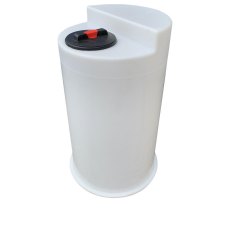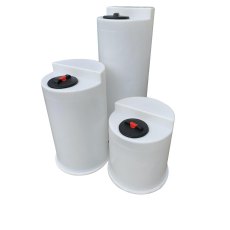301 - 350 Litres FAQs
What’s a potable / wholesome water tank?
Water tanks can be classified as ‘potable’ or 'Wholesome water' and ‘non potable’. If you are storing clean water for human consumption, whether it be for drinking, prepping food or cleaning dishes etc, then a potable water tank is what you are after. All potable (wholesome water) tanks must conform to the WRAS (Water Regulations Advisory Scheme) so that the liquid is safe for human consumption.
Non-potable tanks are for the safe storage of non-drinking water or for ‘not suitable’ for human consumption, in many different environments and applications. Non-potable tanks can be used in applications like rainwater harvesting, irrigation, agriculture & horticulture and commercial purposes where mains water is not available.
The difference in classification between the two comes from the materials used during the manufacturing process, specifically the type of plastic used to line the inside of the tank which comes into contact with the contained water. Non potable tanks are more porous, making it easier for the bacteria to grow and can sometimes let off gases which can contaminate the water. The WRAS approved material lines the inside of the tank, making the tank fit for human consumption, either ingested or used on the skin.
What outlet do I require?
The majority of our water tanks come with an outlet as standard. We can offer a range of water tanks where the tanks can either ‘Drilled’ or ‘Undrilled’. ‘Drilled’ meaning allowing water to escape from the tank via the outlet, whereas ‘Undrilled’ is when the outlet will remain sealed, preventing liquid from coming out and ensuring the contents of the tank is only touching plastic.
If the position of the outlet is required in an alternative position to the standard one offered or extra to the one positioned, we can offer a plastic Fusion socket. This can be welded anywhere on the tank using a drawing supplied by us, positions marked out by you, then fitted by the manufacturer.
Plain tanks (with no outlets) can also be offered.
If you require a plastic fusion socket or a plain tank, then please contact our Customer Service Team, who will be happy to help with your requirements.
Tap or hose tail kits, what’s the difference and when would I need one?
We offer a range of tap kits, each displaying the size of the hosetail and the outlet size the kit will suit. Tap Kit 5 (TPK5) is the best solution if you require a garden hose to be fitted. Our range of Hosetail kits allows you to attach a hose or pipe to the tank, leak-free. They are designed for continuous flow and come in varying sizes depending on the outlet.
All our tap kits come with a Jubilee clip and PDFE tape for that secure fit.
Baffled Water tanks, what are they and when are they recommended?
Baffled water tanks are tanks with an intergral wall system, which is primarily designed to strengthen and support the structure of the tank, when the tank is full of water.
Due to the structure of the baffles they can also be used for transporting water. The Baffles distrupt the movement of water, from surging from one side to the other. However, if you are transporting water, water tanks can be extremely hazardous when transporting large volumes of water. Please make sure the water tanks are installed and secured correctly, by a suitable qualified person before transportation. Baffled water tanks are an ideal solutions for car valeters, window cleaners or anyone who has to transport liquids using plastic water storage tanks and containers.
What is the difference between Potable (wholesome water) and Non-Potable water tanks?
A potable water tank or 'Wholesome water tank' is suitable for storing drinking water and must adhere to specific government regulations. A non-potable water tank stores water that can be used for other purposes like flushing toilets and watering plants, but is not safe for human consumption.
All potable water tanks, like these GRP tanks, must be submitted to the WRAS for testing, approval and accreditation and be approved in line with the Water Supply (Water Fittings) Regulations 1999. Potable water tanks are usually constructed from food-grade polyethylene and finished with a smooth interior to protect against bacteria growth. Our potable water tanks come in a wide range of capacities, from 4 litres to 30,000 litres.
Non-potable tanks store water that can be used for plumbing purposes, such as flushing the toilet and in washing machines, as well as for gardening. They are often used in industrial and commercial premises, horticultural and market garden applications, agricultural irrigation and civil engineering situations where mains water is not available. In fact, non-potable water tanks are suitable for any application where the water or liquid stored will not be consumed by humans or animals.
What size Hot water tank do I need for 4 people?
The hot water tank size you’ll need for four people will depend entirely on your hot water usage habits. To get an accurate answer, you’ll need to calculate how much hot water your household of four would use during its busiest time. If you regularly use several hot water appliances at the same time each day, you’ll want to take that into consideration. But if you’ll rarely be using more than one hot water appliance at a time, a smaller tank would be adequate.
If you’re just looking for an estimate, a simple rule of thumb is to allow between 40 litres for each occupant in the house – so as a very rough guide, a household of four people may use around 160 litres of hot water. However, this should be used as a very general guide and may not accurately match your hot water needs.
What size hot water tank do I need for 2 people?
Getting the correct sized hot water tank is important. If your tank is too small for your needs, you will keep running out of water. If your tank is too large, you will waste money as your system will have to work harder to keep a larger amount of water hot – even though you’re not using it. It’s best to find a tank size that comfortably covers your needs, so you’re not left short, but also not paying for what you won’t use.
Although there may only be two of you using the hot water tank, you’ll want to think about your water usage habits. Do you like to take long showers? And do you have a large shower head that will increase the demand on your hot water system? If you regularly use your dishwasher or washing machine, this should also be taken into account.
For a very rough estimate, a simple rule of thumb is to allow between 40 litres for each occupant. This equates to approximately 80 litres for a two-person household. However, this should be used as a very rough guide and may not accurately match your hot water needs.
What type of water tank do I need?
At Tanks Direct, we stock a range of different water tanks. From rainwater harvesting to wastewater treatment, there are water tanks designed for all types of water storage. The type of water tank you need will depend on what you plan to use it for.
If you are storing drinking water, you will need a potable water tank, like these GRP tanks. They are suitable for storing clean water that is fit for human consumption, prepping food and cleaning dishes. They meet government approved standards and regulations for the safe storage of drinking water. Non-potable water tanks store water that can be used for other purposes like flushing toilets and watering plants, but is not safe for human consumption.
If you’re storing hazardous materials or liquids, check out our range of IBCs (Intermediate Bulk Containers) or if you’re working in the agricultural, farming or horticulture sector, you may want to have a look at our agricultural water tanks that are built to withstand the changeable outdoor environment. Our rainwater harvesting tanks are great for collecting and storing rainwater, that can then be used to flush your toilets and wash your clothes.
We have many more types of water tanks available at Tanks Direct. If you’d like any help and advice choosing your water tank, don’t hesitate to contact our friendly team.
How long should a water storage tank last?
There are many factors that can affect how long a water tank should last:
Usage
The purer the water you’re storing in your tank, the longer your tank is likely to last. For example, if you’re storing salt water, there is a much higher risk of corrosion and damage to the tank. Clean water is much less likely to damage your tank.
Materials
Most water tanks will be made from either plastic or metal. Plastic tanks are non-biodegradable, so it shouldn’t break down over time. For this reason, you should use a specialist waste disposal company at the end of your tank’s life. A good quality polymer plastic water tank should last between ten and twenty years. Metal water tanks are usually made from steel, which can be melted down and recycled at the end of its life. A steel tank should last over 30 years.
Location
Where your tank is located could also affect its lifespan. If your water tank is stood in water, it could damage it, so try to ensure your tank is placed on a solid foundation. The UV treatment on plastic tanks can also be reduced if exposed to long hours of direct sunlight.
How much does it cost to install a water storage tank?
Water tank installation and replacement costs can vary greatly based on several factors.
First, you’ll want to consider the cost of the tank itself. The bigger the tank, the bigger the price tag. The material the tank is made of will also impact the cost, with metal water tanks costing slightly more than plastic ones.
When it comes to the installation, underground water tanks generally cost more to install than above ground water tanks. Underground water tanks need an excavation crew to dig out the area where the tank will go, so you will need to factor in the cost of labour to do this. If you are installing a cold-water storage tank in an attic, the biggest challenge is getting the tank inside the loft through the loft hatch and removing the old tank. Ease and accessibility will play an enormous factor in the final cost.
Finally, you will need to consider the cost of a plumber to connect the pipes. If you’re wanting any additional add-ons for your water tank, such as booster pumps to increase the water pressure, there may be additional costs to consider.
We recommend consulting your local council and homeowners' association to ensure that your water tank installation meets all the required guidelines.
How heavy do I need my marquee weight to be?
Choosing the right weight for your marquee is crucial for ensuring its stability and safety, especially in windy conditions. There are several factors to consider determining the ideal weight for your specific situation. The first is the size and type of marquee you are using. A larger marquee naturally requires more weight to hold it down effectively. Additionally, different marquee styles have varying wind resistance. Pop-up gazebos typically have a smaller footprint and lower profile, requiring less weight compared to a spacious marquee with high walls and a peaked roof. The weight required may vary depending on the surface the marquee is placed on too. A hard, stable surface like concrete requires less weight compared to softer ground like grass or sand. Soft ground offers less resistance to wind, so additional weight is necessary to compensate and prevent the marquee from being lifted or shifted. If you're setting up your marquee in a calm and sheltered location, the weight requirements can be slightly relaxed. However, if you anticipate wind gusts or if your location is prone to strong winds, you'll need to factor in a higher weight capacity to ensure the marquee remains secure and doesn't pose any safety risks.
What materials are the plastic tanks manufactured from?
Plastic water tanks can be made of lots of different materials, however the majority of tanks we offer are made from either a medium density polyethylene (MDPE) or a high density polyethylene (HDPE).
What’s a standard hose pipe size?
UK hose pipe diameters range from ½” to ¾” inch diameters. The majority of standard size garden hoses are 1/2” BSP, however we do offer accessories for the ½3/4” hose, if required.

 Login
Login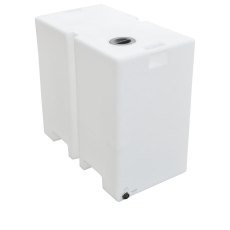
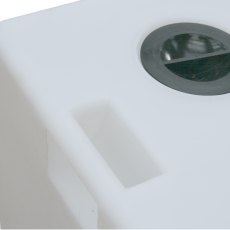
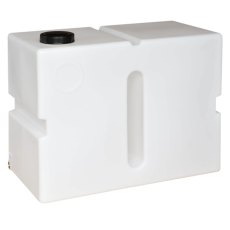
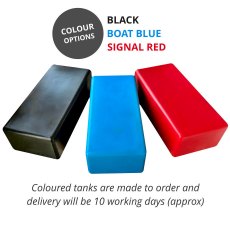


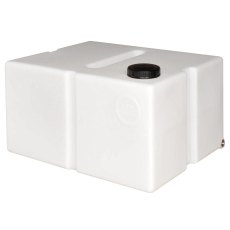
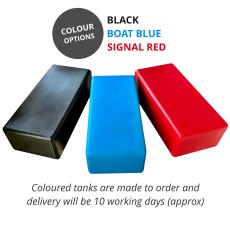
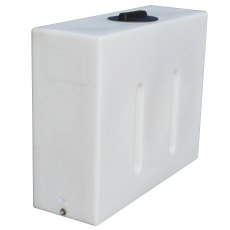
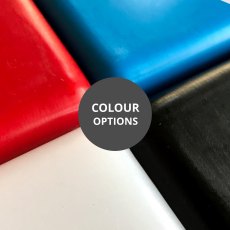
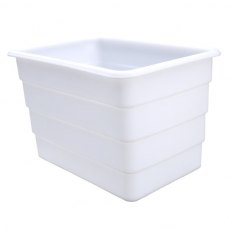
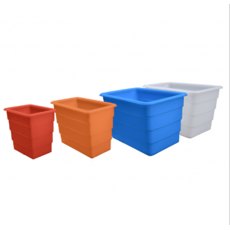
.png)

